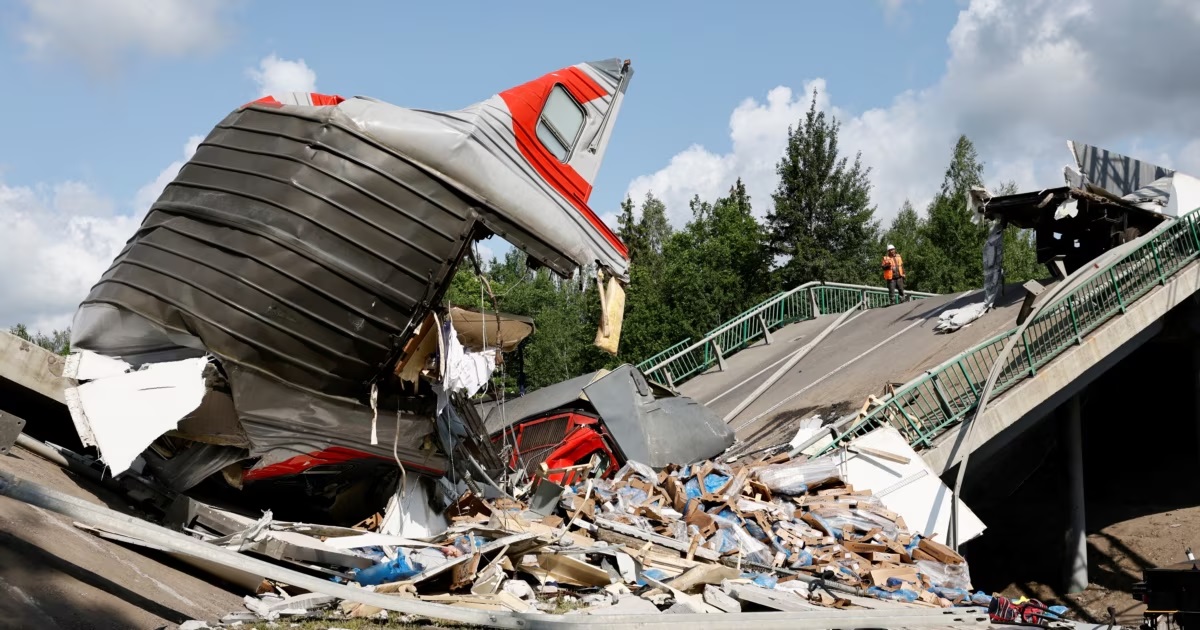Online media reports say Russian investigators have blamed explosions for the train derailments that occured on the night of Saturday, May 31, 2025.
It was gathered that the overnight incidents in Russia’s border regions of Bryansk and Kursk led to the collapse of two bridges, causing deadly train derailments.
Russian investigators blame explosions say the destruction was caused by explosions, which they are now treating as acts of terrorism.
At least seven people were killed, and dozens were injured in the chaos, as both passenger and freight trains were derailed due to the structural failures.
In Bryansk, a road bridge collapsed onto railway tracks late Saturday, causing a passenger train bound for Moscow to derail.
According to regional authorities, seven people died and at least 69 others were injured, including three children.
The train had 388 passengers on board and was traveling from Klimovo to Moscow.
The crash occurred in the Vygonichskyi district, approximately 100 kilometers from the Ukrainian border.
Footage circulating on social media showed dramatic scenes of rescue operations.
Emergency workers were seen climbing over twisted metal and injured passengers screaming in the background.
The state-run Interfax agency quoted Bryansk’s acting governor, Alexander Bogomaz, who confirmed the bridge was blown up during the train’s passage.
Simultaneously, in the neighboring Kursk region, a rail bridge collapsed while a freight train was crossing, causing the train to derail.
Part of it fell onto a road below.
Governor Alexander Khinshtein said the incident occurred in the Zheleznogorsk district.
One of the train’s drivers sustained leg injuries, and the entire crew was hospitalized.
In a separate, third incident, railway tracks were damaged on the Unecha-Zhecha section in Bryansk, though no casualties were reported.
The national rail operator, Russian Railways, confirmed the damage.
Initially, Moscow Railways attributed the Bryansk derailment to “illegal interference in the operation of transport” in an online statement, but that reference was later removed.
Russia’s Investigative Committee later stated that both bridge collapses were caused by deliberate explosions.
Prosecutors have since launched formal investigations into what is now officially being treated as terrorism.
The events occurred just one day before proposed peace talks in Turkey, reportedly encouraged by the United States.
The aim of the talks was supposedly to try and bring an end to the three-year-old war in Ukraine.
This timing has sparked accusations from Russian officials who allege the explosions were part of a coordinated sabotage effort by Ukrainian special services.
Russian politicians claim the acts were intended to derail potential negotiations, stir public fear, and provoke a harsher stance from Moscow.
Andrei Kartapolov, chair of the defence committee in the Russian State Duma, stated that the incidents were “definitely the work of the Ukrainian special services.”
He added that their goal was to undermine the negotiation process and intimidate civilians.
Despite this, he insisted such tactics would not succeed.
The Kremlin reported that Russian President Vladimir Putin had been updated throughout the night on the incidents.
The emergency ministry dispatched a team to the site in Bryansk, while Russian Railways sent repair crews to handle the damage.
In Moscow, an AFP journalist observed ambulances stationed at Kievsky railway terminal, waiting to receive injured passengers.
Ukrainian officials have not directly commented on the bridge collapses.
On the other hand Ukraine’s military intelligence service (GUR) stated that a Russian military freight train transporting food and fuel to Crimea had been destroyed.
However, the GUR did not claim responsibility for the bridge incidents or suggest they had carried them out.
The intelligence statement emphasized that a critical logistics route linking Moscow with occupied territories in Zaporizhzhia and Crimea, annexed by Russia in 2014, had been severed.
These attacks follow a series of sabotage operations across Russia since the start of the full-scale invasion of Ukraine in February 2022.
Many of these operations have reportedly targeted the railway infrastructure.
Kyiv argues that the infrastructure is being used to move troops and weaponry to support Moscow’s war efforts.
The latest destruction also comes amid growing fears of a major summer offensive, with cross-border strikes escalating and Russian troops reportedly amassing along the eastern front.
Ukraine has been cautious about the planned talks in Istanbul, stating it would await Russia’s ceasefire proposals before committing to negotiations.
Meanwhile, U.S. President Donald Trump has increased pressure on both sides to end the conflict.
He has warned he may withdraw support if peace efforts fail, potentially leaving Kyiv heavily reliant on European aid.
The dual bridge disasters underscore the intensifying pressure on Russia’s internal security and the broader complexity of the ongoing conflict with Ukraine.







